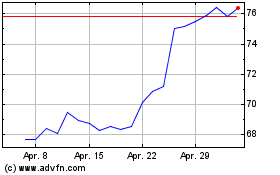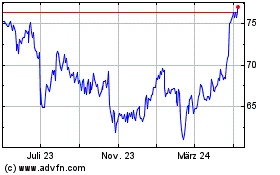Combination of AstraZeneca, Russian Vaccine to Undergo Trial -- Update
11 Dezember 2020 - 5:44PM
Dow Jones News
By Georgi Kantchev in Moscow and Jenny Strasburg in London
AstraZeneca PLC will test whether a combination of its Covid-19
vaccine and Russia's Sputnik V shot can boost effectiveness in
fighting Covid-19 as part of broadening efforts to slow the global
spread of the virus.
In an agreement announced Friday, the two-shot AstraZeneca
vaccine, which was developed jointly with the University of Oxford,
would use one of Sputnik V's two components, known as adenoviral
vectors, in a clinical trial. The trial is due to begin later this
month, according to a statement from Russia's sovereign-wealth
fund, which has backed Sputnik V.
The trial could help raise the international profile of Russia's
vaccine, which has drawn skepticism from Western scientists and
politicians for its speedy approval ahead of large-scale clinical
trials in August. Moscow has sold Sputnik V to dozens of countries,
including Brazil, India and Mexico.
AstraZeneca's decision "may offer a route to markets that
[Russia] would otherwise be unable to access," said Ian Jones,
professor of virology at the University of Reading in the U.K.
The Oxford-AstraZeneca vaccine -- the cheapest of the West's
front-runner shots and the one with the widest global distribution
plans -- has shown to be between 62% and 90% effective depending on
dosage, with the majority of trial participants at the lower end of
the range. The vaccine partners said this week they would ask the
U.K. and other countries for emergency-use authorization of the
vaccine, and hope to secure authorization in the U.K. within
weeks.
In Russia, AstraZeneca has a deal with local company R-Pharm
Group for the production of one billion doses of its vaccine, Chief
Executive Pascal Soriot said last month. That Russian production
could be extended into 2022, and is in addition to the roughly
three billion doses AstraZeneca has agreed to make world-wide in
2021, assuming regulators authorize the vaccine.
Results from clinical trials showed that Sputnik V, which was
developed by Moscow's state-run Gamaleya Institute of Epidemiology
and Microbiology, was more than 90% effective in protecting people
from Covid-19. Russia began rolling it out to its population on
Saturday but manufacturing problems have hobbled plans for a speedy
mass vaccination campaign. With more than 2.5 million infections
nationwide, Russia has the world's fourth-largest case load after
the U.S., India and Brazil.
Some scientists have called for the testing of combinations of
vaccine technologies to understand if they could increase
effectiveness.
AstraZeneca noted Friday that clinical trials are planned in the
U.K. combining more traditional vaccine technology with a new
technology that leverages mRNA, short for the molecular couriers
called messenger RNA that carry genetic instructions to cells. The
mRNA technology is behind the vaccine made by Pfizer Inc. and
Germany's BioNTech SE, the first Western-authorized Covid-19 shot
and which the U.K. began administering this week. The vaccine is
expected to be approved in the U.S. as soon as Friday.
It wasn't clear how advanced the U.K.'s plans were to match
different vaccines. But the chief executive of BioNTech strongly
advised against efforts to combine the company's vaccine with
others.
"This not endorsed by us," Ugur Sahin said. "We are trying to
clarify why this is happening, but it is something we cannot
possibly recommend."
The shot developed by Oxford and AstraZeneca works like a more
traditional vaccine, introducing a weakened cold virus found in
chimpanzees into the body to trigger immunity. Sputnik V is also a
two-shot vaccine based on the adenovirus, one commonly found in
humans. It uses two types of the virus for its first and second
shot. AstraZeneca will use one of them for its clinical trial, the
Russian Direct Investment Fund, the sovereign-wealth fund, said
Friday.
Combining various vaccine components -- after extensive testing
-- is common practice to improve antibody response, experts said.
Health-care providers for years have combined multiple childhood
vaccines into a single shot.
With Covid-19, researchers want to understand whether mixing
different shots can make the first shot of a two-dose regimen
better at prepping the body for the second dose. The hope is that
additional combinations of shots can provide strong, lasting
immunity without causing additional serious side effects, experts
say.
At the same time, scientists want to watch closely for changes
in side effects from mixing technologies and vaccines as there is
still little known about how long the immunity from vaccines lasts,
and that different vaccines will work better in different groups
depending on age, underlying health conditions and other factors,
according to experts.
Prof. Jones said that in the case of AstraZeneca and Sputnik V,
the combination should be straightforward since both are based on
the adenovirus.
"But if you were combining different vaccines you would have to
formally consider the possibility that the adverse effects, even if
mild, were additive," he said.
--Bojan Pancevski contributed to this article.
Write to Georgi Kantchev at georgi.kantchev@wsj.com and Jenny
Strasburg at jenny.strasburg@wsj.com
(END) Dow Jones Newswires
December 11, 2020 11:29 ET (16:29 GMT)
Copyright (c) 2020 Dow Jones & Company, Inc.
AstraZeneca (NASDAQ:AZN)
Historical Stock Chart
Von Jun 2024 bis Jul 2024

AstraZeneca (NASDAQ:AZN)
Historical Stock Chart
Von Jul 2023 bis Jul 2024
